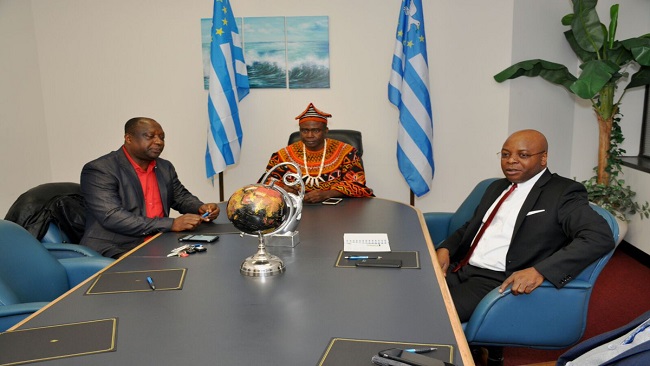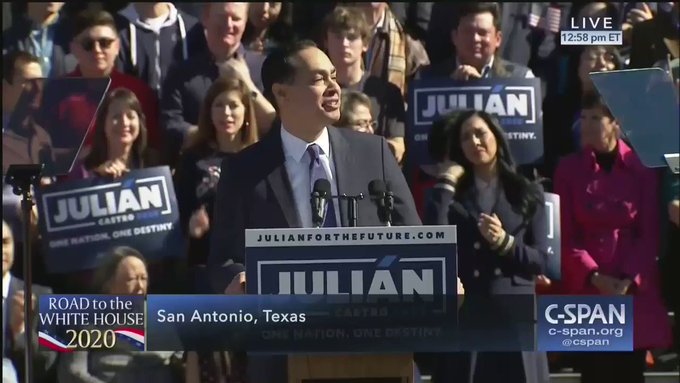20, January 2019
US: Trump offers deal to end government shutdown despite rejection by Dems 0
US President Donald Trump has offered a deal to end the government shutdown, linking protection for undocumented immigrants to funding of a border wall, amid immediate rejection by Democratic lawmakers.
Addressing the nation on Saturday in a televised speech from the White House, Trump outlined a plan that would extend temporary protections for young undocumented immigrants brought to the US as children — known as Dreamers — and individuals from some Central American and African nations, in exchange for $5.7 billion funding for a wall on the US-Mexico border.
“Both sides in Washington must simply come together, listen to each other, put down their armor, build trust, reach across the aisle and find solutions,” Trump proclaimed, but then insisted, “A wall is not immoral. The radical left can never control our borders. I will never let that happen.”
He further added, “As a candidate for president, I promised I would fix this crisis, and I intend to keep that promise one way or the other.”
According to local press reports, Trump’s deal would extend protections for Deferred Action for Childhood Arrivals (DACA) program recipients for three years and a three-year extension of protections for Temporary Protected Status (TPS) holders in exchange for the partial border wall funding.
Democrats, however, quickly rejected the deal, with Senate Minority Leader Charles Schumer of New York emphasizing that Trump’s offering some protections for DACA and TPS recipients “in exchange for the wall is not a compromise but more hostage taking.”

Schumer further accused the US president of “putting forward one-sided and ineffective remedies,” adding, “There’s only way out: open up the government, Mr. President, and then Democrats and Republicans can have a civil discussion and come up with bipartisan solutions.”
House Speaker Nancy Pelosi further described Trump’s proposal as a “non-starter” in a statement released shortly before his nationally-televised speech, insisting that the deal could not pass the House of Representative.

“Democrats were hopeful that the president was finally willing to re-open government and proceed with a much-need discussion to protect the border. … It is unlikely that any one of these provisions alone would pass the House, and taken together, they are a non-starter,” Pelosi further said in her statement.
The development came as tensions are also running high between Trump and Pelosi after she asked him to postpone the annual State of the Union address, slated for January 29. Trump in turn prevented lawmakers from using military aircraft for congressional trips, including for Pelosi’s planned visit to the war-torn Afghanistan this week.

This is while two congressional aides cited in local press reports also pointed out that Democratic leadership was not consulted on the forthcoming White House proposal, further noting that Democrats had previously rejected similar ideas.
“Similar inadequate offers from the Administration were already rejected by Democrats. The BRIDGE Act does not fully protect Dreamers and is not a permanent solution,” said a senior House Democratic aide.
“This is not a compromise as it includes the same wasteful, ineffective $5.7 billion wall demand that shut down the government in the first place,” the aide added.
Trump also underlined in his speech that he was making his pitch to “break the logjam” that has paralyzed Washington since late December, leaving roughly a quarter of the government closed and forcing roughly 800,000 federal employees be furloughed or work without pay.
The partial government shutdown, which marks the longest lapse in funding in modern US history, is currently in its 29th day as the stalemate over the funding of the border wall persists.
Meanwhile, several recent polls have shown that a majority of Americans blame Trump for the partial shutdown after the US president left a meeting earlier this month with Pelosi when the House speaker said she wouldn’t discuss border wall funding even if he reopened the government.
Seeking to make his case during his speech, Trump further seized on his belief that there is a “crisis” along the border requiring “urgent action.”
“Illegal immigration reduces wages and strains public services. The lack of border control provides a gateway, a very wide and open gateway, for criminals and gang members to enter the United States,” he claimed.
Source: Presstv


























20, January 2019
Congo-Kinshasa: Top court upholds Tshisekedi presidential election win 0
DR Congo’s top court on Sunday declared opposition leader Felix Tshisekedi the winner of disputed presidential elections after throwing out a legal challenge by the runner-up.
Announcing the final results of the long awaited poll, the Constitutional Court said Tshisekedi had won by a simple majority, paving the way for him to take over from longterm leader Joseph Kabila in an official ceremony on Tuesday.
Runner-up Martin Fayulu immediately called on the international community to reject the results, after the court said his appeal was “unfounded”.
“I ask the entire international community not to recognise a power that has neither legitimacy nor legal standing to represent the Congolese people,” he said of Tshisekedi, declaring himself “the only legitimate president”.
Inspired by
Tshisekedi’s victory was first announced earlier this month based on provisional results by the Independent National Election Commission (CENI) but it was challenged both at home and abroad, with the African Union appealing for the final results to be delayed.
On Sunday, the Consitutional Court said Fayulu had failed to prove any inaccuracies. “Only the CENI has produced authentic and sincere results,” judge Noel Kilomba said.
Hundreds of supporters of Tshisekedi had gathered outside the court holding placards saying “No to interference” and “Independent country” as riot police stood nearby.
‘Not their business’
The election commission announced on January 10 that Tshisekedi had provisionally won with 38.57 percent of the vote against Fayulu’s 34.8 percent.
Fayulu denounced the figures as an “electoral coup” forged by Tshisekedi and Kabila, and filed an appeal with the Constitutional Court.
At a summit on Thursday, AU leaders said there were “serious doubts” about the vote’s provisional results and called for the announcement of the final results to be suspended.
But DR Congo government spokesman Lambert Mende had snubbed the demand, saying: “I don’t think it is the business of the government or even of the African Union to tell the court what it should do.”
The AU also announced that its commission chief Moussa Faki Mahamat and Rwanda’s President Paul Kagame, currently the AU chairman, were expected to fly to DR Congo on Monday.
The European Union said it joined the AU in inviting “all the Congolese players to work constructively with this (AU) delegation to find a post-electoral solution which respects the Congolese people’s vote”.
Appeal
The Financial Times and other foreign media have reported seeing documents that confirm Fayulu as the winner.
“If the court declares Tshisekedi victor, the risk of isolation would be enormous and untenable for a country positioned right in the middle of the continent,” Adeline Van Houtte of the Economist Intelligence Unit wrote on Twitter.
Fayulu’s camp had hailed the AU appeal for the final result to be put on hold, but Tshisekedi’s entourage branded it “scandalous”.
The dispute has raised fears that the political crisis that began when Kabila refused to step down at the end of his constitutional term in office two years ago, could turn into a bloodbath. The vast and chronically unstable country lived through two regional wars in 1996-97 and 1998-2003, and the previous two elections, in 2006 and 2011, were marred by bloody clashes.
The AU has taken the firmest line of all major international bodies with regard to the post-election crisis. The Southern African Development Community (SADC), a bloc that includes Angola and South Africa, initially called for a recount and a unity government.
But in a later communique, it made no mention of those demands, instead calling on Congolese politicians to “address any electoral grievances in line with the Democratic Republic of Congo’s Constitution and relevant electoral laws”.
(AFP)